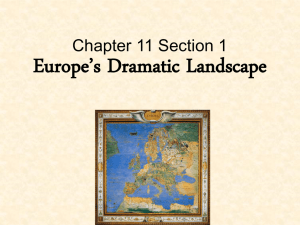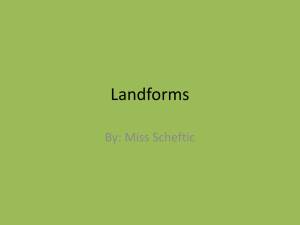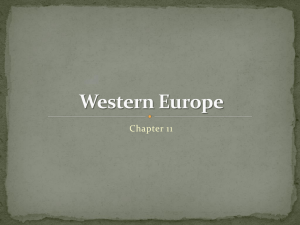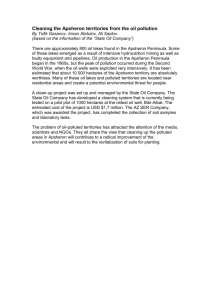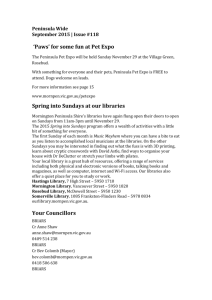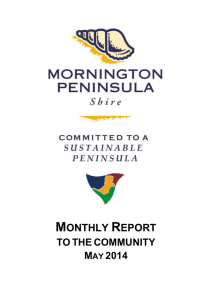Mornington Peninsula Localised Planning Statement
advertisement
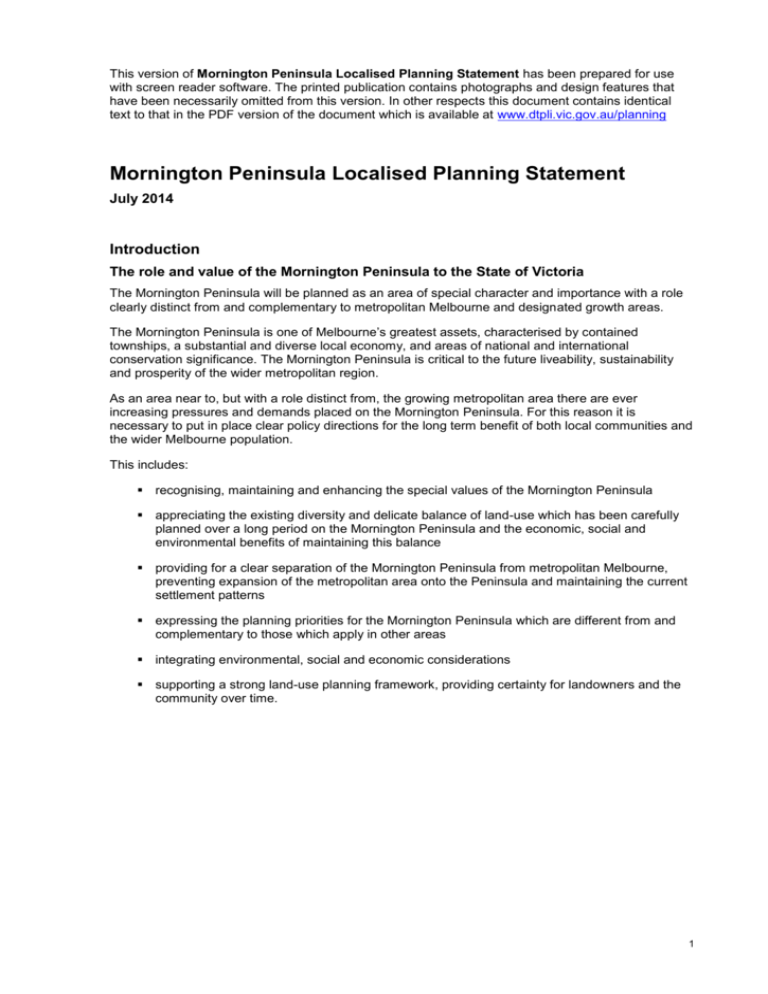
This version of Mornington Peninsula Localised Planning Statement has been prepared for use with screen reader software. The printed publication contains photographs and design features that have been necessarily omitted from this version. In other respects this document contains identical text to that in the PDF version of the document which is available at www.dtpli.vic.gov.au/planning Mornington Peninsula Localised Planning Statement July 2014 Introduction The role and value of the Mornington Peninsula to the State of Victoria The Mornington Peninsula will be planned as an area of special character and importance with a role clearly distinct from and complementary to metropolitan Melbourne and designated growth areas. The Mornington Peninsula is one of Melbourne’s greatest assets, characterised by contained townships, a substantial and diverse local economy, and areas of national and international conservation significance. The Mornington Peninsula is critical to the future liveability, sustainability and prosperity of the wider metropolitan region. As an area near to, but with a role distinct from, the growing metropolitan area there are ever increasing pressures and demands placed on the Mornington Peninsula. For this reason it is necessary to put in place clear policy directions for the long term benefit of both local communities and the wider Melbourne population. This includes: recognising, maintaining and enhancing the special values of the Mornington Peninsula appreciating the existing diversity and delicate balance of land-use which has been carefully planned over a long period on the Mornington Peninsula and the economic, social and environmental benefits of maintaining this balance providing for a clear separation of the Mornington Peninsula from metropolitan Melbourne, preventing expansion of the metropolitan area onto the Peninsula and maintaining the current settlement patterns expressing the planning priorities for the Mornington Peninsula which are different from and complementary to those which apply in other areas integrating environmental, social and economic considerations supporting a strong land-use planning framework, providing certainty for landowners and the community over time. 1 Mornington Peninsula Localised Planning Statement policy area THE PLANNING STATEMENT Integrated planning Objective To recognise that maintaining the special values of the Mornington Peninsula is dependent on integrated and balanced planning, involving all agencies and having regard to the needs and aspirations of current and future generations. Strategies 1. Planning for the Mornington Peninsula will be directed towards the planning and management necessary to achieve the following objectives: Sustaining the economic, social and environmental contributions of the Peninsula to the metropolitan region. Maintaining and enhancing the character and role of the settlements, towns and villages on the Mornington Peninsula, both individually and as part of a hierarchy of settlements, and to effectively managing future change. Conservation and enhancement of natural systems and biodiversity. 2 Providing for recreational demand based primarily on the experience and enjoyment of the natural and cultural values of the Mornington Peninsula. Protecting coastal areas for their special recreational, community and conservation values. Promoting sustainable agricultural use of rural land. Providing for a world class port on Western Port, designed and operated in accordance with best practice and to the highest environmental standards, and supported by effective freight infrastructure and buffer areas to avoid impact on adjoining townships. Providing for engagement and involvement of the community in shaping long term decisions. 2. This planning policy will guide decision making on the Mornington Peninsula by every Department, Public Authority, Council and Responsible Authority. 3. Planning for the Mornington Peninsula will take into account the interests of both the Victorian community as a whole and the particular needs and interests of the Peninsula’s local communities and will have regard to the impact on both current and future generations. 4. The Mornington Peninsula will not accommodate major population growth and the existing Urban Growth Boundary and Green Wedge rural area will be maintained. 5. Urban development, including residential and low density residential development in whatever form, will be limited to areas within the Urban Growth Boundary. 6. The significance of the Mornington Peninsula as part of the Western Port Biosphere will be recognised and given effect. 7. The establishment of a strong and consistent overall policy framework for future land use and development is essential, including the use of mandatory controls and standards where necessary, due to the particular pressures on the Peninsula’s rural landscapes, coasts, towns and villages, and the risk of unintended and unplanned change through cumulative impacts. 8. The development of old and inappropriate subdivisions will be prevented and a resolution sought for these areas consistent with current planning objectives, including consideration of restructuring to facilitate appropriate forms of development in some areas. 9. Sustainability in the context of this Statement will be considered in terms of the economic, social and environmental dimensions of land use and development, and their interaction. Sustainability and stewardship will be guiding principles, ensuring that the resources of the Mornington Peninsula are used in such a way that the value of these resources, in the broadest sense, is maintained for current and future generations. 10. State of the Environment reporting or other appropriate monitoring frameworks will be established to evaluate the effectiveness of this policy statement in achieving the intended aims and to ensure an appropriate and timely response to emerging issues. Conservation of natural systems and biodiversity Objective To ensure conservation of natural systems and biodiversity on the Mornington Peninsula. Strategies 11. The natural systems of the Mornington Peninsula, on both public and privately owned land, will be conserved and managed for their habitat and biodiversity values and to maintain and enhance the experience of natural environment. This will include the conservation of areas of significant flora and fauna value and sites of geological significance. 12. Planning for the Mornington Peninsula will be directed towards maintaining and increasing biodiversity and increasing the resilience of natural systems. Where the development of land requires environmental offsets these will be provided on the Mornington Peninsula and in the local area where appropriate. 3 13. Planning for the coast will recognise that this is an inherently dynamic environment, and that it is important to clearly identify the role and function of different sections of coast, consistent with the environmental capacity of different areas, and to ensure public investment to support the recreational demands on the coast in appropriate areas to maintain and enhance the coastal experience. 14. Maintenance of environmental quality and protection against pollution and degradation of every description will be primary considerations. 15. Planning for the area will take into account information from scientific studies and other research into the area and adjacent bays and catchments. 16. The proper consideration of environmental risks, including bushfire, erosion and inundation will be included in all planning decisions. 17. Careful consideration of the environmental implications and other impacts of all proposed development will be carried out, in accordance with the scale and type of each proposal and in consultation with appropriate authorities on the need for and form of environmental assessment studies that may be required. Protecting the character and role of the settlements, towns and villages Objective To protect the role and character of the Mornington Peninsula’s settlements, towns and villages. Strategies 18. The hierarchy of settlements on the Mornington Peninsula will be recognised and maintained, with provisions to reinforce the distinction between major activity centres and other townships through appropriate density, height and built form controls and provisions to avoid out of centre commercial development. For the purposes of commercial centre planning the Mornington Peninsula will be considered separate from metropolitan Melbourne. 19. The townships of the Mornington Peninsula are expected to accommodate at most moderate and generally low levels of housing growth, with many smaller towns and villages intended to accommodate very limited further development. Special regard should be given to the provision for appropriate housing growth in the Western Port area, having regard to employment growth over time associated with the further development of the Port of Hastings and the opportunities this provides. 20. Development within the Urban Growth Boundary, whether within residential, commercial or other areas, will be of a type and scale that maintains the existing valued character of each town or settlement, or supports a change to a preferred future character that is clearly established through community consultation and the adoption of a relevant local area plan. In the assessment of any planning permit application, priority will be given to any local character statement or policy adopted by the responsible authority. 21. The character and functions of the towns and villages will be protected and there will be no linear development between towns along the coast or expansion into the areas between townships. Development within each settlement will only be of a scale and character appropriate to the role, function and location of that settlement. 22. Future planning for the settlements on the Peninsula will be based on principles of good design, Integrated Local Area Planning and Environmentally Sustainable Development, all in accordance with the character, scale, role and functions of each settlement, including: a) ensuring a proper balance and coordination between increases in housing and population and access to employment, services, health and education facilities, open space, parkland and other infrastructure that meets the needs of the community b) provision for commercial development, tourism and other activities that contribute to the development of local employment opportunities, the vitality of town centres and the economic wellbeing and prosperity of the community, and located to reinforce the role of different townships and activity centres on the Peninsula 4 c) integration of transport, access and land use planning d) the provision of appropriate drainage, sewerage and other infrastructure to manage the impact of human settlement and activity on the environment e) careful attention to achieving good design which responds to and is appropriate to the character and function of the particular place, including consideration of built form and scale, access and connectivity, environmentally sensitive design, heritage, streetscape and landscape values, including the retention of vegetation where this is a key element of township character f) consideration and protection of the heritage values of each township. 23. Having regard to the important relationship between coastal Crown land and the townships and settlements of the Mornington Peninsula, and the increasing demand for recreation on the coast, the principle of net community benefit will be given priority in the consideration of applications for the use of coastal Crown land in identified coastal activity nodes. Protecting landscape and cultural values Objective To protect landscape and cultural values. Strategies 24. Areas of special character, beauty and significance, including areas of strategic importance necessary to maintain the sense of separation between townships, will be designated and protected. 25. The character of the Peninsula’s rural area, rural landscapes, coastlines and seascapes will be protected, including: a) conservation of sites and areas of historic, scientific and cultural value b) provisions to ensure the appropriate siting and appearance of buildings and works c) provisions to prevent intrusive commercial development, including service stations and signage on major roads. 26. All development will be designed to respect and, where possible, enhance the natural environment, the rural landscape and scenic values of the Green Wedge. 27. Roads and access routes will be classified, with appropriate planning provisions to protect the safety, function and amenity of each route according to its role. 28. Extractive industries will be contained to carefully limited works and sites. Providing for sustainable agriculture Objective To recognise and protect the value of the Mornington Peninsula for agriculture and to support and encourage sustainable agricultural land use. Strategies 29. Due account will be given to the value of the Mornington Peninsula for agriculture and other rural pursuits and to the role of primary producers and other land managers. 30. Planning for the Peninsula will recognise the opportunities to combine agricultural land use at all scales with provision for conservation of environmental systems, recreation and agri-tourism. 31. Subdivision of rural land must be strictly limited to avoid further fragmentation and to ensure that the intensity of land use and development is appropriate to the agricultural capacity and natural attributes of the land and to the protection of the environment and landscape. The re-subdivision of land will only be approved on the basis of a clear proposal to improve land management and to avoid adverse impact on landscape values. 5 32. The use of land for rural living will be managed to limit the impact on the sustainable agricultural use of land and to ensure recognition of the need of farms to operate without excessive constraint in a rural environment. 33. The residential occupation of rural land in the Green Wedge will be linked to and conditional upon measures to limit: a) the impacts on agriculture, biodiversity, cultural heritage significance and landscape character b) the impact of the proposed dwelling on both the existing and potential use of adjoining rural land. 34. The residential occupation of rural land in the Green Wedge will be linked to and conditional upon the occupiers clear recognition and acceptance of the potential for agricultural use of nearby land to affect future amenity and a clear proposal to ensure a positive contribution to the objectives of sustainable agriculture, or the protection and enhancement of heritage, biodiversity and landscape values, or some combination of these goals consistent with the values, opportunities and constraints of each site. Provision for recreation and tourism Objective To recognise and protect the recreational role of the Mornington Peninsula and to make provision for appropriate tourism based use and development. Strategies 35. The recreational role of the Peninsula, with particular emphasis on the experience of the natural environment and opportunities for outdoor and unstructured recreation, will be maintained by protecting the qualities of its natural environments, landscapes and cultural heritage. 36. Appropriate recreational activities will be supported, particularly where these promote understanding of, cultivate interest in, or are directly associated with rural pursuits, cultural heritage or the environment in its natural state. 37. The value of tourism, including eco-tourism and agri-tourism will be recognised and supported in appropriate locations. In rural Green Wedge areas tourism based development will play a complementary role to the primary values of the rural Peninsula, being biodiversity, agriculture and landscape. In rural Green Wedge areas tourism based developments of a kind, scale and location appropriate to the natural environment and rural character of the Peninsula will be considered provided: a) they operate in conjunction with and support significant agricultural, recreational or conservation activity on the land, and b) there is sufficient on site buffer provided to avoid constraining the use of adjacent land. 38. Planning for the Mornington Peninsula will include provision to specify minimum requirements for sites and activities associated with tourism based development to ensure long term protection of the landscape, conservation and agricultural values of the Mornington Peninsula. 39. Support for larger scale tourism based development in appropriate locations within the rural Green Wedge area will be considered on the basis of substantial strategic justification, will be subject to comprehensive design and environmental impact assessment, must maintain a low overall development footprint and will need to demonstrate substantial net community benefit. 40. Use and development, which by its intensity or form would result in defacto urbanisation of the rural or coastal landscape, including large scale caravan park or mobile home based developments, will not be permitted. 41. Planning will consider the need for infrastructure and facilities to support the recreational role of the Peninsula, to improve the ability to meet the demands of visitors and reduce the impact of recreational use on environmental systems, the coast and township areas. 6 Planning for the port area Objective To ensure the appropriate use and development of the Hastings port area and adjacent hinterland. Strategies 42. Planning will ensure the appropriate development of the Hastings port area and adjacent hinterland, having particular regard to the need to maintain the value of this area for selected port and port related industrial purposes which depend upon or gain significant economic advantage from proximity to natural deep water channels, and including the exclusion of further land subdivision within the port area pending determination of proper future use. 43. Planning will provide for the protection of the important values and resources of Western Port and its land catchment having regard to the importance of recreation, nature conservation and tourism. These will be major considerations in the planning and management of the area for port and port related industrial purposes. 44. Port and port related industrial development, including major transport routes will be physically and visually separated from township residential areas by the establishment of substantial landscaped rural buffers. Land at Crib Point will not be used for port purposes or port related uses which are likely to generate significant volumes of heavy vehicle movement on local roads or through towns and villages. 45. Residential development in the port planning area will be strictly limited and contained to selected existing township areas within the existing Urban Growth Boundary. 46. Port and port related industrial development will be carefully designed to limit environmental and visual impacts. Development controls will ensure a high standard of design and substantial onsite landscaped buffer areas for port related industrial facilities. 47. Major port and port related development will occur within the framework provided by an approved Port Area Strategic Plan and Port Development Plan. Authorised and published by the Victorian Government, 1 Treasury Place, Melbourne July 2014 ACCESSIBILITY If you would like to receive this publication in an accessible format, such as large print or audio, telephone Victorian Government Contact Centre on 1300 366 356 or email planning.systems@dtpli.vic.gov.au Unless indicated otherwise, this work is made available under the terms of the Creative Commons Attribution 3.0 Australia licence. To view a copy of this licence, visit creativecommons.org/licences/by/3.0/au It is a condition of this Creative Commons Attribution 3.0 Licence that you must give credit to the original author who is the State of Victoria. This document is also available in accessible Word format at www.dtpli.vic.gov.au/localised-planning-statements All images courtesy of Mornington Peninsula Shire Council. 7

